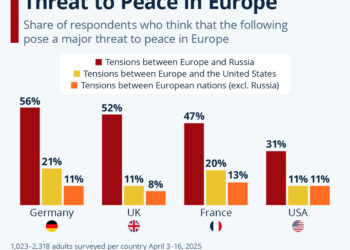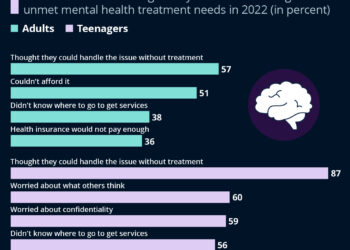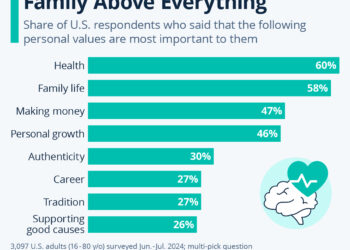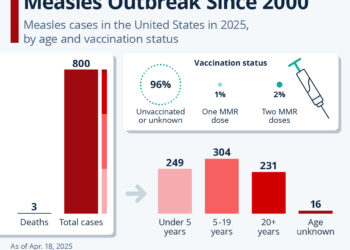The Surge of Measles Misinformation: Understanding the Trends
The Current State of Measles in the U.S.
The United States is currently grappling with one of the most significant measles outbreaks in years. With over 800 confirmed cases nationwide and more than 600 reported in Texas alone, the urgency to address public health messaging has never been greater. This resurgence in measles cases draws attention not only to the disease itself but also to the misinformation that has been circulating about its vaccine.
The Role of Misinformation
A recent report by the Kaiser Family Foundation (KFF) sheds light on the increasing prevalence of misinformation regarding measles and the measles, mumps, and rubella (MMR) vaccine. Conducted in April 2025, the poll revealed disturbing trends regarding public perception of vaccine safety. Nearly two-thirds of U.S. adults reported having heard or read that the measles vaccine poses greater risks than the disease itself. This statistic marks a worrying 15 percentage point increase from a similar survey conducted in March 2024.
Misconceptions About Vaccine Safety
Some of the most alarming claims regarding the MMR vaccine assert that it has been linked to autism. The KFF survey found that approximately two-thirds of adults have encountered this false claim. In response to this falsehood, a coalition of leading autism advocacy organizations recently issued a joint letter reiterating the scientific consensus: "Vaccines do not cause autism." The letter emphasized the need for public health messaging to be grounded in scientific evidence to ensure the safety of all communities.
Public Belief in Misinformation
While many individuals come across false information, belief in these claims is particularly concerning. The KFF report highlighted that a significant number of respondents—25 percent—believed it was probably or definitely true that the MMR vaccine causes autism. Additionally, 19 percent thought that receiving vaccinations is riskier than contracting measles. This reflects a troubling trend where demystifying valid scientific conclusions is becoming increasingly challenging.
The Vitamin A Misconception
Another stark reminder of prevalent misinformation is the claim that vitamin A can prevent measles. About 24 percent of respondents believed this assertion, despite lack of scientific backing. While vitamin A supplementation may be recommended for individuals suffering from vitamin A deficiency—especially in cases of measles—it’s important to note that it doesn’t treat the primary symptoms of the disease or prevent infection from occurring in the first place.
The Partisan Divide on Vaccine Perception
The KFF study also spotlighted a significant partisan divide regarding beliefs about measles and the MMR vaccine. Republicans exhibited higher levels of belief in the misinformation compared to Democrats. This divergence adds another layer of complexity to public health messaging efforts.
The Role of Parents in Vaccine Decisions
Interestingly, the survey showed that parents exhibited a higher tendency to believe in measles misinformation compared to other groups. This is particularly concerning as parents are pivotal in making healthcare decisions for their children, including whether to vaccinate. The implications of this belief could drastically affect vaccination rates and, consequently, public health.
The ‘Malleable Middle’: A Population at Risk
One of the most significant takeaways from the KFF report is the presence of a large group of respondents—referred to as the "malleable middle." This demographic includes individuals who expressed uncertainty about the claims surrounding the MMR vaccine. For each of the discussed claims, at least half of the respondents either thought the statements were probably true or probably false. This indecisiveness makes them particularly susceptible to both misinformation and public health messaging that could either affirm or refute erroneous beliefs.
The Importance of Trustworthy Public Health Messaging
Given the clear trends revealed in the KFF survey, it’s paramount for public health officials to bolster communication efforts that confront misinformation. Transparency and scientifically accurate information are essential in countering the narrative perpetuated by vaccine critics and addressing the growing mistrust surrounding vaccinations. By providing robust, evidence-based resources, public health authorities can help foster a more informed populace that can better resist the allure of misinformation.
This discussion about measles and misinformation serves as a crucial reminder of the need for vigilance and proactive communication strategies in the realm of public health.






